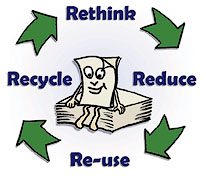Classroom presentations on the following topics are available for schools in Winnipeg.
Tracking the Blue Box
Everyone is curious about what happens to recyclables after they get picked up. Using samples and illustrations, this presentation tracks four common materials (paper, metal, glass, plastic) from blue box through re-processing to end use. With older students, we also critically consider the role of recycling as a resource conservation practice. Our most popular presentation. K – Grade 8
Beyond the Blue Box
We examine the principles and practices of recycling in the context of all four Rs. The concepts of full-cost accounting and environmental stewardship are introduced to raise some of the broader questions about shared responsibility and environmental sustainability. Students are encouraged to consider the ecological consequences of their everyday resource-use decisions. Grades 9 – 12
Paper Chase
Paper is one of the most familiar classroom materials. We explain how paper is made, discuss paper recycling, examine alternative fibres, and show samples of recycled paper products. Students are encouraged to consider how all four Rs (Rethink, Reduce, Reuse, Recycle) can be applied to paper. K – Grade 6
Composting: Nature’s Recycling
We explore the amazing process by which organic waste is turned into an invaluable garden material (humus) that plants love, identify some of the living organisms that do the work, and discuss why composting is so important in waste reduction. K – Grade 12
Litterless Lunches
Eating a nutritious lunch is essential to our health, but how does the garbage from our lunches affect the health of the Earth? A “regular” brown bag lunch is reviewed in terms of amount of garbage created, and types of garbage produced. Students generate simple changes for creating a litterless lunch — one that is healthy for them and the Earth. K – Grade 8
Our Ecological Footprint
Everything we use to survive (including the air, water, food we consume, and clothes we wear) originates in Nature. This eye-opening presentation asks whether our rates of consumption and waste disposal are sustainable, and whether our use of resources is fair to others with whom we share the planet. Students discuss specific ways we can all help to make a difference. Grade 6 – 12
Water: A Drop in the Bucket
Water is everywhere. It makes up our rivers, lakes and oceans. It’s in our air, our food, and even in us! We all need clean water every day to stay alive, but how much water do we use? Are we wasting water? Why should we be concerned about the way we use and abuse this resource? This presentation addresses all of these questions, concentrating on positive individual actions and choices. K – Grade 12
Our Greenhouse World
Earth is a greenhouse that keeps people warm and helps plants grow. We explain how a greenhouse works, consider the effect of increased heat on our greenhouse planet, and discuss ways of keeping planet Earth healthy and safe. Suggested actions include recycling, saving energy, and conserving water. Grade 2 – 4
The Greenhouse Effect
Starting with the science of the greenhouse effect, this presentation identifies gases (and their sources) that contribute to climate change. Possible measures to help bring atmospheric greenhouse gases down to stable levels are discussed. We emphasize positive actions students, schools and communities can take. Grade 5 – 8
Climate Change
This presentation for older grades examines the causes, effects and implications of climate change. Climate change goes well beyond “global warming”. Large-scale shifts in ecosystems, disruptions in species populations and increased incidence of severe weather are among the predicted and increasingly observed effects. Students are introduced to this issue as a case-study in environmental decision-making. Grades 9 – 12
About the Presentations
- We speak to individual classes (maximum 30 students).
- Presentation length varies by grade and topic. Most are 30 – 45 minutes long.
- Presentations are offered without charge. However, honorarias are greatly appreciated.
- Presentations must be booked a minimum of two weeks in advance. March, April and May are particularly busy. We recommend booking early to avoid disappointment.
More information
Phone 204.925.3771
Request a presentation on-line.




Recent Comments